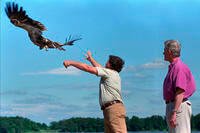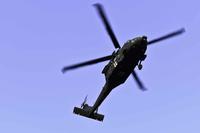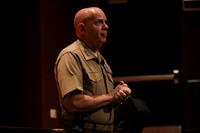The four-person crew on a Black Hawk helicopter from McEntire Joint National Guard Base in Hopkins was on a training mission over Lake Marion when an osprey shattered the windshield in early June, the National Guard reported Wednesday.
“Bird!” Chief Warrant Officer 2 Brandon Painter said just before impact.
In what a news release called a “heart-stopping moment,” the split-second warning allowed the commanding pilot, Chief Warrant Officer 4 Henry Wallace, the time to make the copter climb.
Wallace is a UH-60 standardization pilot with A Company, 1st Battalion, 111th Aviation Regiment and was evaluating Painter on low-level combat maneuvers and a mock hurricane response.
“There is no real emergency printed for this type of scenario,” Wallace said. “However, our first instinct was to look at the aircraft instruments. I was on the flight controls and as a crew, we determined we still had control.”
The news release described a grisly scene with the dead bird lodged in the shattered window.
“As I flew the aircraft, I had Mr. Painter monitor the instruments and cautions panel for any potential lights. Crew chiefs were busy scanning for nearby landing locations just in case the situation worsened as well as monitored our instruments,” Wallace said.
He drew on the cohesiveness of the crew, which had just returned from a year-long deployment to Sinai.
“We had worked well together and understood each other’s capabilities,” he said.
It could have been much worse. Crew members had on their Aviation Life Support Equipment and the visors on their helmets were down.
“If the pilot had not had his visor in the down position, he most likely would have suffered severe injury to his eyes and possibly lost control of the aircraft,” said Army Col. John McElveen, commander of the South Carolina National Guard’s 59th Aviation Troop Command.
In the end, the crew landed safely at a small airport about 10 miles away.
Wallace offered this advice to aviators.
“Keep the critical and creative thinking in the process and not only talk about these things in the formations but go out, train, and don’t be afraid to fail,” he said. “That way, when something as simple as a bird strike or something more critical or catastrophic does happen, training takes over.”
©2023 The State. Visit thestate.com. Distributed by Tribune Content Agency, LLC.











